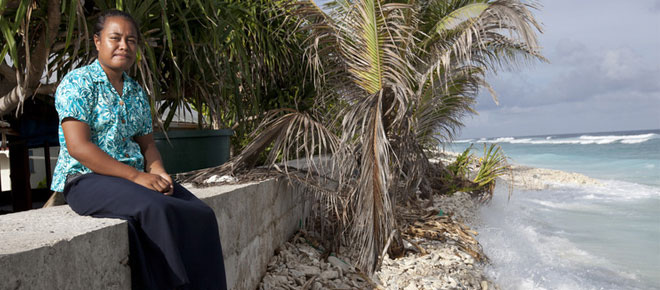After a year of New Zealand’s role as Chair of the Pacific Islands Forum, the Cook Islands is about to pick up the baton for the next year. The region faces formidable challenges ahead and the Pacific’s regional institutions even more so. The forthcoming Pacific Islands Forum leaders meeting will be a crucial test of whether regionalism, government leadership and the Pacific institutions can step up to meet these challenges.

Focus on reducing hardship, suffering and wasted opportunities
After a year of New Zealand’s role as Chair of the Pacific Islands Forum, the Cook Islands is about to pick up the baton for the next year. The region faces formidable challenges ahead and the Pacific’s regional institutions even more so. The forthcoming Pacific Islands Forum leaders meeting will be a crucial test of whether regionalism, government leadership and the Pacific institutions can step up to meet these challenges.
The levels of hardship being experienced by many Pacific people are growing. Progress has been made on some issues – there is a stronger appreciation of the importance of agriculture to most Pacific people, and cooperation on access to tuna stocks is increasing returns to the Pacific. However, the Pacific is still well off track on the Millennium Development Goals (MDGs). The 2012 MDG tracking report prepared by AusAID concludes that no Pacific Island Country is on track to meet the 2015 target for Goal 1 – “Eradicate Extreme Poverty”.
There is resistance to using the term poverty to describe the situation faced by over 30 per cent of the Pacific’s people, but many don’t get basic services such as education or healthcare, particularly those living in remote and rural areas; few of the Pacific’s youth have formal employment opportunities; and almost one third of the Pacific’s people cannot earn enough income to meet their basic needs. As a result, preventable deaths are far above the level that should be acceptable, health indicators are too low and few young people have opportunities to build a better life. Whether or not it is called “poverty”, it is resulting in widespread suffering, a denial of basic rights and is failing to use the Pacific’s most important assets – its people.
Tackling this challenge should be the main focus of the Forum’s work. But in the welter of meetings and initiatives it is hard to see where the voice of vulnerable and marginalised people is being heard, and how they can hold their leaders to account for tackling hardship. These voices are especially needed in controversial issues that are likely to be dealt with in the margins of the meeting, including trade negotiations. Focused programmes, targets and inclusion of civil society voices are urgently needed.
Build a shared programme to tackle climate change
Oxfam will release a report “Owning Adaptation in the Pacific: Strengthening Governance of Climate Adaptation Finance” during the Pacific Islands Forum . The report acknowledges the good work that is being undertaken by some governments (focusing on Tonga, Vanuatu and PNG), the effective support provided by some donors and the work of civil society.
However, all too often these initiatives are not connected up. The report calls on donors, governments, civil society and others to build a more inclusive partnership to address the multiple threats from climate change. This must include a broad process of building capacity, working across different parts of government, strengthening learning and accountability processes, building joint responses with civil society, traditional leaders, women’s groups, youth, private sector and others, and including those who are most vulnerable.
Gender rights
It is welcome that there are likely to be announcements of new initiatives to support gender rights in the Pacific, focusing on eliminating violence against women, strengthening the economic empowerment of women and building strong leadership roles for women. The Forum Secretary-General Tuiloma Neroni Slade has recently called for gender empowerment and equality to be central to the achievement of national and regional outcomes. Oxfam’s work supports these initiatives and we are encouraged by exciting progress with the participation of women in political leadership in countries like Papua New Guinea and Samoa.
Ensuring the Pacific’s voice is heard
This will be a Pacific Islands Forum meeting where the voices of non-island countries are loud – this year it is not only leaders like John Key and Julia Gillard, but also likely to include US Secretary of State, Hillary Clinton, UN Women Executive Director Michele Bachelet, and senior representatives from other countries including China, which is playing an influential role in the Pacific. Their support for the Pacific is welcome, but all too frequently their voices drown out those of Pacific leaders, and their agendas take over. This is particularly problematic at a time when the Forum leaders need to listen closely to the voices of their people, not just to their donors.
In Auckland last year, Pacific leaders asked the Forum Secretariat to strengthen civil society engagement in policy formulation and in briefing the leaders. There has however, been slow progress and there are, as yet, few mechanisms to ensure that the issues being addressed by leaders are widely understood or that the voices of civil society are heard.
This inclusiveness is crucial at a time when the regional agenda is being challenged by groupings of Melanesian, Polynesian and Micronesian states, and the effectiveness of the Pacific’s institutions is being challenged, including by a recent review of the Pacific Islands Forum Secretariat, commissioned by the New Zealand Government. The Pacific’s policy making processes need to be made more transparent and inclusive.



